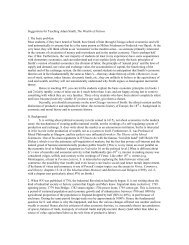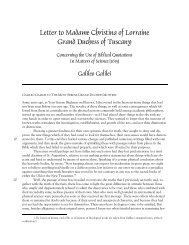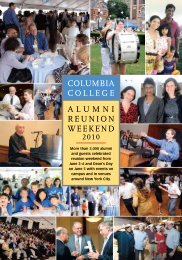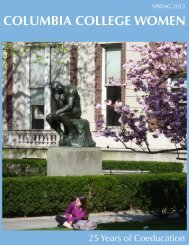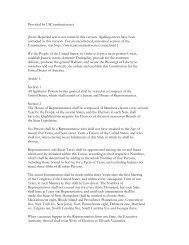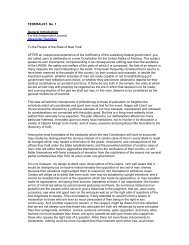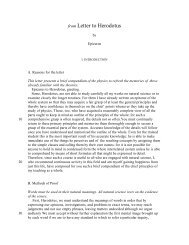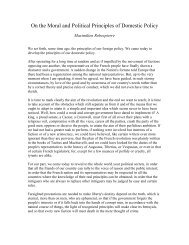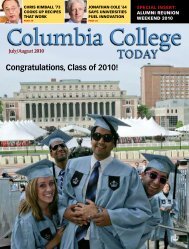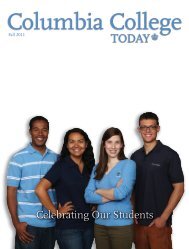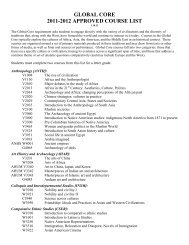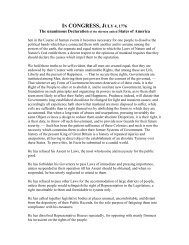Download this issue as a PDF - Columbia College - Columbia ...
Download this issue as a PDF - Columbia College - Columbia ...
Download this issue as a PDF - Columbia College - Columbia ...
You also want an ePaper? Increase the reach of your titles
YUMPU automatically turns print PDFs into web optimized ePapers that Google loves.
Volume 40 Number 3<br />
Spring 2013<br />
EDITOR AND PUBLISHER<br />
Alex Sachare ’71<br />
EXECUTIVE EDITOR<br />
Lisa Palladino<br />
MANAGING EDITOR<br />
Alexis Tonti ’11 Arts<br />
EDITORIAL ASSISTANT<br />
Elena Hecht ’09 Barnard<br />
FORUM EDITOR<br />
Rose Kernochan ’82 Barnard<br />
CONTRIBUTING WRITER<br />
Shira Boss ’93, ’97J, ’98 SIPA<br />
EDITORIAL INTERN<br />
Karl Daum ’15<br />
DESIGN CONSULTANT<br />
Jean-Claude Suarès<br />
ART DIRECTOR<br />
Gates Sisters Studio<br />
CONTRIBUTING PHOTOGRAPHERS<br />
Chris Balmer ’07<br />
Eileen Barroso<br />
Bruce Gilbert<br />
Leslie Jean-Bart ’76, ’77J<br />
Matthew Septimus<br />
Published quarterly by the<br />
<strong>Columbia</strong> <strong>College</strong> Office of<br />
Alumni Affairs and Development for<br />
alumni, students, faculty, parents and<br />
friends of <strong>Columbia</strong> <strong>College</strong>.<br />
SENIOR EXECUTIVE DIRECTOR<br />
OF ALUMNI AFFAIRS<br />
Bernice Tsai ’96<br />
Address all correspondence to:<br />
<strong>Columbia</strong> <strong>College</strong> Today<br />
<strong>Columbia</strong> Alumni Center<br />
622 W. 113th St., MC 4530, 6th Fl.<br />
New York, NY 10025<br />
212-851-7852<br />
E-mail (editorial): cct@columbia.edu;<br />
(advertising): cctadvertising@columbia.edu.<br />
Online: college.columbia.edu/cct and<br />
facebook.com/columbiacollegetoday.<br />
ISSN 0572-7820<br />
Opinions expressed are those of the<br />
authors and do not reflect official<br />
positions of <strong>Columbia</strong> <strong>College</strong><br />
or <strong>Columbia</strong> University.<br />
© 2013 <strong>Columbia</strong> <strong>College</strong> Today<br />
All rights reserved.<br />
Letters to the Editor<br />
Pride of the Lions<br />
I enjoyed the profile of psychology professor<br />
Herbert Terrace [Winter 2012–13].<br />
I enrolled in his introductory psychology<br />
cl<strong>as</strong>s in the early 1970s and found myself<br />
intrigued by the subject matter. I distinctly<br />
remember the sleepless “all-nighter”<br />
cramming for the final exam. Afterward,<br />
I changed majors from pre-architecture to<br />
psychology. Professors such <strong>as</strong> Terrace and<br />
Eugene Galanter, a noted psychophysicist,<br />
exemplify the scientific side of psychology<br />
rather than the pop-psychology that permeates<br />
our culture. Professor Norma V.S.<br />
Graham taught my first statistics cl<strong>as</strong>s,<br />
and I studied graduate-level statistics at<br />
Michigan with Professor David H. Krantz,<br />
who’s now at <strong>Columbia</strong>.<br />
Since those college days, I’ve made a<br />
pretty good career teaching psychology<br />
at a South Tex<strong>as</strong> community college. I am<br />
grateful to the world-cl<strong>as</strong>s university that<br />
opened its doors to a confused 18-year-old<br />
from the borderlands, and to all the great<br />
professors who serve <strong>as</strong> role models of<br />
academic excellence.<br />
Ismael Dovalina ’74<br />
San Antonio, Tex<strong>as</strong><br />
It’s been 44 years since the night of “the<br />
bust” in 1968, but I’ll never forget Professor<br />
[Ronald] Breslow’s actions that long night.<br />
As one of the walking wounded, having<br />
been whacked in the head by a Tactical Patrol<br />
Force billy club while simply observing<br />
the commotion (and following orders to<br />
disperse), I w<strong>as</strong> wandering around outside<br />
the locked campus when he magically appeared,<br />
extremely disturbed by what had<br />
just happened to our sacrosanct temple of<br />
learning. It w<strong>as</strong> 4 a.m. and nobody could<br />
get back into their dorms. Professor Breslow<br />
gathered <strong>as</strong> many students <strong>as</strong> he could<br />
fit in his car and drove us over the GW<br />
Bridge to his home. I remember watching<br />
the sun rise <strong>as</strong> we headed for safety. He fed<br />
us and allowed us to sleep a bit before returning<br />
us to campus. I w<strong>as</strong> able to w<strong>as</strong>h<br />
my bloody hair.<br />
Professor Breslow’s freshman chemistry<br />
cl<strong>as</strong>s stands out in my memory. He<br />
made chemistry magical! Now rewired<br />
from a 35-year career <strong>as</strong> an emergency<br />
physician, I have pivoted into fighting<br />
climate change. Whenever discussing<br />
ocean acidification — the process of adding<br />
club soda to the se<strong>as</strong> — I think of him.<br />
That means that Ron Breslow resides in<br />
my heart and soul. Thank you, <strong>Columbia</strong>,<br />
for Professor Breslow. He is a great teacher<br />
and humanitarian.<br />
Dr. Peter G. Joseph ’70<br />
San Anselmo, Calif.<br />
I read with great ple<strong>as</strong>ure “Pride of the<br />
Lions” [Winter 2012–13]. Of the four featured<br />
professors, my contact w<strong>as</strong> in the<br />
mid-’60s with Professor David Sidorsky.<br />
As an undergraduate I took a series of inspiring<br />
courses with him. It w<strong>as</strong> he who<br />
awakened me from my “dogmatic slumbers”<br />
(to borrow the words of Kant). I will<br />
remember Professor Sidorsky’s lucid and<br />
penetrating lectures <strong>as</strong> well <strong>as</strong> his quickness<br />
of mind and amazing serenity during<br />
cl<strong>as</strong>s discussions. His intelligence, wit<br />
and unfailing kindness to his students<br />
impressed me deeply; now, many years<br />
later, I think of him with great respect and<br />
admiration. It is wonderful to know that<br />
he is still going strong.<br />
Dougl<strong>as</strong> E. Golde ’66<br />
New York City<br />
At the end of my second year of pre-med<br />
at <strong>Columbia</strong> in 1966, I w<strong>as</strong> struggling, seriously<br />
discouraged and having grave doubts<br />
about my ability to become a physician. This<br />
all changed in September of that year, when<br />
I walked into Ron Breslow’s organic chemistry<br />
cl<strong>as</strong>s. As any physician knows, organic<br />
chemistry is the course that in those days<br />
“separated the men from the boys.”<br />
Professor Breslow took a course with a<br />
terrifying reputation and made it a wonderful,<br />
exciting year of detective work and<br />
problem solving. His inspirational teaching<br />
turned my academic career around,<br />
enabling me to become a physician educator.<br />
I w<strong>as</strong> happy to see that many sub-<br />
sequent generations of <strong>Columbia</strong> students<br />
have benefited from Professor<br />
Breslow’s superb teaching style. I will<br />
forever be grateful to him.<br />
Dr. Daniel L. Lorber ’68<br />
Port W<strong>as</strong>hington, N.Y.<br />
Gutmann, a Good Man<br />
I am reading the fabulous Winter<br />
2012–13 <strong>issue</strong> that arrived a day or<br />
so ago, and am brought to a halt halfway<br />
down page 19, in the piece about<br />
Professor [David] Sidorsky (whom of<br />
course I never encountered <strong>as</strong> a student<br />
though he sounds quite interesting).<br />
You name a James Goodman <strong>as</strong><br />
one of his early teachers, but I think<br />
Sidorsky must have meant philosophy<br />
professor James Gutmann (Cl<strong>as</strong>s<br />
of 1918, ’36 GSAS), who together with<br />
professor Robert Carey ’29 GSAS led a<br />
f<strong>as</strong>cinating advanced CC course that I<br />
attended in the 1948–49 academic year,<br />
a course that kept us all on our toes<br />
thinking hard about where the world<br />
we were then living in w<strong>as</strong> going <strong>as</strong><br />
well <strong>as</strong> how it had gotten to where it<br />
then stood. Both Gutmann and Carey<br />
were fabulous teachers, and I believe<br />
Gutmann should be remembered by<br />
his correct name; he never changed it,<br />
and w<strong>as</strong> a good man indeed.<br />
Joseph B. Russell ’49<br />
New York City<br />
Professor James Gutmann (Cl<strong>as</strong>s of 1918, ’36 GSAS)<br />
at his apartment in 1979.<br />
PHOTO: NICK ROMANENKO ’82<br />
Scientific Methods<br />
Unfortunately, the article on Professor<br />
Carl Hart [Winter 2012–13] doesn’t say<br />
what scientific procedure he used to get<br />
his findings on drug use. The North Star<br />
of scientific method is double blind experimentation<br />
but <strong>this</strong> isn’t usually used<br />
with humans when it involves a substance<br />
suspected of being harmful. The<br />
tobacco industry rightly says that high<br />
statistical correlation between smoking<br />
and lung cancer doesn’t prove that the<br />
former causes the latter. (For instance, a<br />
chromosome that h<strong>as</strong> a gene for a tendency<br />
to smoke can also have a gene for a<br />
tendency for lung cancer.) Nevertheless,<br />
the statistics and experiments with rats<br />
make us wary of smoking. But Professor<br />
Hart belittles the usefulness of experiments<br />
with rats. I see nothing unethical<br />
about not experimenting on people. The<br />
opposite can be unethical, <strong>as</strong> when blacks<br />
were purposely given syphilis without<br />
their knowledge. That may be scientific,<br />
but not ethical. I <strong>as</strong>sume Professor Hart<br />
did nothing like that, but just what did he<br />
do I’d like to know the details of experiments<br />
rather than know how his personal<br />
history gives him insights.<br />
Donald Marcus ’55<br />
Brooklyn, N.Y.<br />
Who Should Be Admired<br />
Eric Foner ’63, ’69 GSAS states [Winter<br />
2012–13] that the talk show of Rush Limbaugh<br />
shows “overt racism.” This is an<br />
example of Foner’s McCarthyite smear<br />
tactics, whereby he smears a radio show<br />
without disclosing any facts to substantiate<br />
his statement. Furthermore, he states<br />
we should admire the American radicals,<br />
<strong>as</strong> these are the “people who are trying to<br />
make <strong>this</strong> a better society.” Really What<br />
about all the Democrats and Republicans<br />
who have made <strong>this</strong> a better society —<br />
or does he think there are none In addition,<br />
I personally witnessed the thugs<br />
in the Students for a Democratic Society<br />
who used force to prevent my friend from<br />
participating in naval ROTC exercises on<br />
the campus. Other members of <strong>this</strong> organization<br />
burned our campus. I do not feel<br />
that the violence and totalitarianism of the<br />
American radicals in the p<strong>as</strong>t few decades<br />
made the United States a better society. I<br />
do agree that radicals in the 19th century<br />
were different. I made a pilgrimage to the<br />
gravesite of my hero John Brown in Elba<br />
(Lake Placid), N.Y. I do not feel that the<br />
violent tactics of the radical left will<br />
make <strong>this</strong> a better society. That is why<br />
my parents escaped from the horrors of<br />
the Nazis and the Communists.<br />
Dr. Roman Kernitsky ’62<br />
Colts Neck, N.J.<br />
Honoring Brig. Gen. Smith<br />
I w<strong>as</strong> ple<strong>as</strong>ed to see the report of Scott<br />
Smith ’86’s promotion to brigadier general<br />
in the U.S. Air Force reported in the<br />
Alumni in The News section of the Winter<br />
2012–13 <strong>issue</strong>. His dedicated service<br />
to our country and his record of leadership<br />
and achievement in our armed<br />
forces clearly deserve <strong>this</strong> recognition.<br />
As a guest at the ceremonies, I also<br />
w<strong>as</strong> impressed by the number of Scott’s<br />
family, friends and colleagues who<br />
gathered for <strong>this</strong> milestone in his career.<br />
<strong>Columbia</strong> graduates who participated<br />
in the three-day celebration in Coral<br />
Gables, Fla., included John Murphy ’86,<br />
Pat McGarrigle ’86, Jack Merrick ’86,<br />
Matt Barr ’87, Arthur “Bunyan” Ajzenman<br />
’83, Dr. Michael Goldfischer ’86<br />
and Dominic DeCicco ’84E.<br />
I am happy to report that neither the<br />
appearances nor the strongly held opinions<br />
of any of these <strong>Columbia</strong>ns seem to<br />
have changed since the mid-1980s.<br />
Andrew Upton ’85<br />
Boston<br />
CCT welcomes letters from readers about<br />
articles in the magazine but cannot print or<br />
personally respond to all letters received.<br />
Letters express the views of the writers<br />
and not CCT, the <strong>College</strong> or the University.<br />
Ple<strong>as</strong>e keep letters to 250 words or fewer.<br />
All letters are subject to editing for space<br />
and clarity. Ple<strong>as</strong>e direct letters for publication<br />
“to the editor” via mail or online:<br />
college.columbia.edu/cct/contactus.<br />
Manage Your<br />
Subscription<br />
If you prefer reading CCT online, you<br />
can help us go green and save money<br />
by opting out of the print edition. Click<br />
“Manage Your Subscription” at college.<br />
columbia.edu/cct and follow the domestic<br />
instructions. We will continue to<br />
notify you by email when each <strong>issue</strong> is<br />
posted online. You may be reinstated to<br />
receive the print edition at any time by<br />
sending a note to cct@columbia.edu.<br />
SPRING 2013<br />
4<br />
SPRING 2013<br />
5



